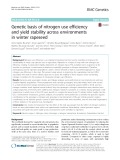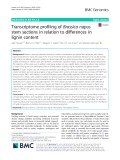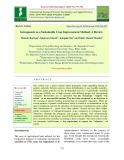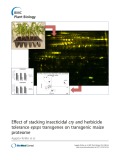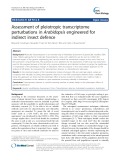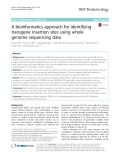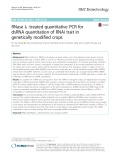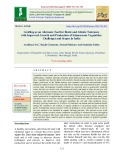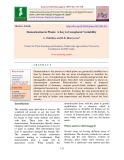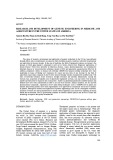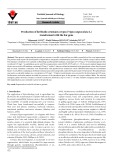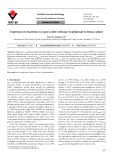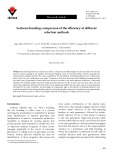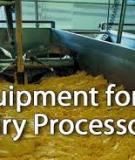
Genetically modified crops
-
Genotyping-by-sequencing (GBS) has emerged as a powerful and cost-effective approach for discovering and genotyping single-nucleotide polymorphisms. The GBS technique was largely used in crop species where its low sequence coverage is not a drawback for calling genotypes because inbred lines are almost homozygous.
 14p
14p  vinarcissa
vinarcissa
 21-03-2023
21-03-2023
 3
3
 1
1
 Download
Download
-
Nitrogen use efficiency is an important breeding trait that can be modified to improve the sustainability of many crop species used in agriculture. Rapeseed is a major oil crop with low nitrogen use efficiency, making its production highly dependent on nitrogen input.
 21p
21p  vinarcissa
vinarcissa
 21-03-2023
21-03-2023
 3
3
 1
1
 Download
Download
-
Transcriptome profiling of Brassica napus stem sections in relation to differences in lignin content
Brassica crops are cultivated widely for human consumption and animal feed purposes, and oilseed rape/canola (Brassica napus and rapa) is the second most important oilseed worldwide. Because of its natural diversity and genetic complexity, genomics studies on oilseed rape will be a useful resource base to modify the quantity and quality of biomass in various crops, and therefore, should have a positive impact on lignocellulosic biofuel production.
 16p
16p  vibeauty
vibeauty
 23-10-2021
23-10-2021
 7
7
 0
0
 Download
Download
-
Our society has a great concern about transgenic crops regarding mixing of genetic materials between species whose hybridization is not possible naturally. Different public policies on the development and use of genetically modified organisms (GMOs) are of high concern with defining proper risk management strategies. Researchers are in agreement that this technology „„tampers with nature‟‟ in an unacceptable manner.
 10p
10p  angicungduoc6
angicungduoc6
 22-07-2020
22-07-2020
 10
10
 2
2
 Download
Download
-
Present increasing trend of population is alarming for food shortage. It was estimated that by the year of 2050 the population rate may increase up to 9 billion. Rapid increase of human population together with global climate variability resulted in increased demand of plant based food and energy sources. Conventional breeding is still limited due to genetic restrictions (high heterozygosity and polyploidy), long juvenile periods, selfincompatibility, resources restricted to parental genome and exposed to sexual combination.
 8p
8p  nguaconbaynhay6
nguaconbaynhay6
 23-06-2020
23-06-2020
 12
12
 1
1
 Download
Download
-
The safe use of stacked transgenic crops in agriculture requires their environmental and health risk assessment, through which unintended adverse effects are examined prior to their release in the environment.
 19p
19p  viminato2711
viminato2711
 22-05-2020
22-05-2020
 15
15
 1
1
 Download
Download
-
Molecular characterization is an essential step of risk/safety assessment of genetically modified (GM) crops. Holistic approaches for molecular characterization using omics platforms can be used to confirm the intended impact of the genetic engineering, but can also reveal the unintended changes at the omics level as a first assessment of potential risks.
 12p
12p  viminato2711
viminato2711
 22-05-2020
22-05-2020
 7
7
 1
1
 Download
Download
-
Genetically modified crops (GM crops) have been developed to improve the agricultural traits of modern crop cultivars. Safety assessments of GM crops are of paramount importance in research at developmental stages and before releasing transgenic plants into the marketplace.
 8p
8p  vihamax2711
vihamax2711
 21-04-2020
21-04-2020
 7
7
 0
0
 Download
Download
-
RNA interference (RNAi) technology has been widely used to knockdown target genes via posttranscriptional silencing. In plants, RNAi is used as an effective tool with diverse applications being developed such as resistance against insects, fungi, viruses, and metabolism manipulation.
 12p
12p  vihamax2711
vihamax2711
 21-04-2020
21-04-2020
 12
12
 0
0
 Download
Download
-
Vegetables shares major part of the daily dishes prepared in Indian kitchen and are rich in carbohydrate, vitamins, minerals and other phyto-nutraceuticals. But less do we know that these vegetables are heavily-laden with synthetic chemicals and pesticides. In order to gain higher yield most of the Indian farmers uses synthetic chemicals and pesticides which ultimately induced in the food chain and affects human and environment health.
 15p
15p  trinhthamhodang4
trinhthamhodang4
 22-03-2020
22-03-2020
 16
16
 1
1
 Download
Download
-
DNA fingerprinting, estimation of molecular genetic diversity, marker assisted breeding and molecular diagnostic tools are the need of the hour for sugarcane crop improvement. Efficient extraction of genomic DNA (gDNA) free from polysaccharides, polyphenols, RNA and other major contaminants is a key to all these molecular activities. We present herewith, a modified DNA extraction protocol that has been optimized for isolating gDNA from endergonic and hardy sugarcane plant and its phytopathogens and endophytic fungi.
 9p
9p  chauchaungayxua3
chauchaungayxua3
 07-02-2020
07-02-2020
 9
9
 0
0
 Download
Download
-
Domestication is the process in which plants are genetically modified over time by humans for traits that are more advantageous or desirable for humans. A set of morphological, biochemical, and physiological traits that distinguishes domesticated plants from their wild progenitor is known as domestication syndrome. Reduction/loss of means of dispersal reduction/loss of dormancy, compact growth habit, earliness, gigantism, photoperiod insensitivity, reduction/loss of toxic substances is the major elements of domestication syndrome.
 6p
6p  chauchaungayxua1
chauchaungayxua1
 04-12-2019
04-12-2019
 11
11
 1
1
 Download
Download
-
The following are important factors in the future development of agrotechnologies - the development of the world population, advancements with regard to education, progress in food production systems in various regions of the world together with the critical situation of malnutrition in different countries worldwide. It is necessary to improve the production and productivity of crops. Pre-harvest and postharvest losses are still too high, and the use of agricultural inputs, such as fertilizers, irrigation and energy, have to be reduced as much as possible.
 19p
19p  ketaucho
ketaucho
 20-11-2019
20-11-2019
 16
16
 1
1
 Download
Download
-
The status of research, development and application of genetic technology in the US has been reflected through efforts and accomplishments in numerous fields including research, medicine, industrial biotechnology and agriculture in the past decades. In the area of medicine, the field of therapeutic purposes on human is the pioneer, in which gene therapy is attempted to carry out in various clinical trials.
 15p
15p  viathena2711
viathena2711
 08-10-2019
08-10-2019
 14
14
 1
1
 Download
Download
-
Rice (Oryza sativa L.) is among the most important food crops that provide a staple food for nearly half of the world’s population. Rice crops are prone to various types of stresses, both biotic and abiotic. Biotic stresses include insect pests, fungus, bacteria, viruses, and herbicide toxicity. Among abiotic stresses, drought, cold, and salinity are also well studied in rice.
 9p
9p  vikimsa
vikimsa
 22-02-2019
22-02-2019
 28
28
 0
0
 Download
Download
-
Plant genetic engineering has opened new avenues to modify crops and has provided a powerful tool for crop improvement. The present study reports the development of regeneration and genetic transformation protocol for the Turkish cowpea cultivar Akkiz.
 7p
7p  sony2711
sony2711
 01-02-2019
01-02-2019
 13
13
 2
2
 Download
Download
-
Glyphosate is a widely used herbicide that inhibits the 5-enolpyruvylshikimate-3-phosphate synthase (EPSPS)-encoding aroA gene in the shikimate pathway. The discovery and cloning of the aroA gene with high resistance is central to breeding a transgenic glyphosate-resistant plant.
 8p
8p  nutifooddau
nutifooddau
 27-01-2019
27-01-2019
 31
31
 2
2
 Download
Download
-
The following study was conducted in order to compare the modified single-seed descent method of selection used in soybean breeding at the Institute of Field and Vegetable Crops in Novi Sad, Serbia, with the standard bulk method and the pedigree method.
 12p
12p  vimb123
vimb123
 12-01-2019
12-01-2019
 22
22
 1
1
 Download
Download
-
Tài liệu Plant Biotechnology Current and Future Applications of Genetically Modified Crops have content: part 1 the current situation, part 2 new development, part 3 safety and regulation.
 307p
307p  nguyennuzenna
nguyennuzenna
 07-09-2014
07-09-2014
 73
73
 15
15
 Download
Download
-
In North America maize is widely utilised due to the suitability of the climate and advances in Genetically Modified (GM) technology which assures consistency of the crop. In areas where conditions for growing maize are not suitable or irrigation is not possible, other crops containing high levels of starch such barley and wheat offer good substitutes. These crops are not harvested until they reach a late “milky dough” stage of maturation so that the levels of starch are maximised.
 30p
30p  conduongdinhmenh
conduongdinhmenh
 07-05-2013
07-05-2013
 43
43
 2
2
 Download
Download
CHỦ ĐỀ BẠN MUỐN TÌM









